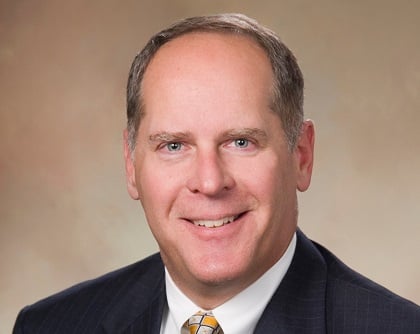

IBA: What has been the main challenge for Fisher Brown Bottrell?
Scott Woods: The primary challenge is perpetuation. I think we are facing a talent shortage in the industry among both agencies
and carriers. While some would say that the focus of concern should be on the sales or producer side of the business, I think there is also a big lack of talent on the service side of the house. We have employed strategies to bring people into the business and to create opportunities to hire new talent in the various marketplaces we are in.
IBA: How have you approached developing the next generation?
SW: We developed a training program for individuals who are coming out of college that is open to all degrees. While this has been successful, along the way, our program participants suggested that we look at implementing a robust intern program that could potentially result in permanent placement.
We decided to adopt the intern approach, and this has worked very well for us, as well as for the students. It’s been a good way for interns to have an opportunity to look at the agency environment and decide if that’s something they are interested in. It’s also given the agency an opportunity to evaluate the candidates’ skill sets.
IBA: In light of the recent storms that have hit the South, what do you expect the long-term effects will be for the industry?
SW: The last time the Florida panhandle had a significant event was Hurricane Ivan in 2004, followed by Hurricane Katrina that
hit Mississippi and Louisiana. Besides wind, both Hurricane Harvey and Hurricane Irma produced significant flooding events.
This leads us to the question of what’s going on with the National Flood Insurance Program reform and funding. If we continue to have more events like this and if losses increase, we would anticipate some tightening of rates, which is natural following major storm events. If storm frequency and severity increase, I think we also need to improve focus on our clients – how can we help them prepare better, and if they have a claim, how can we speed up that process?
With Harvey and Irma, we had two events occurring very close to each other. There are only so many people capable of adjusting claims, so that can affect the time it takes for a client to get attention and their claim handled. I believe it’s important to think about claims triage and how we could possibly use technology more effectively to provide quicker claims response. For instance, I saw one company considering using drone fleets that you could GPS to a specific location for an initial look at damage. I think this will make us seek solutions that are more effective to provide better service to our clients.
IBA: How do you think technology is impacting the industry?
SW: There seems to be a lot of angst about insurtech, with questions about how it’s going to affect the insurance industry as a whole. The real question is, what could new technology do for our clients?
For example, today if I had an accident, I could take a photo and upload the image to my insurance company, and they could send me a check for the damage. But is it going to show all the damage to my car, or would it be better for someone to be hands-on and look at the car to see exactly what is going on? This is a good use of technology that is convenient and quick, but is it the best solution
for our clients?
The fact that there’s a lot of innovative thinking and product development going into how can we do things differently and more e ectively is really an important trend that makes insurtech benefi cial.
